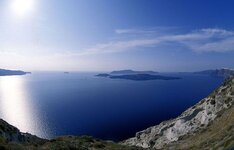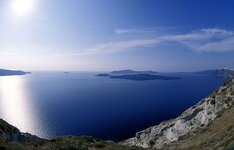Yeah, I do admit that it seems like more people have gone crazy with the whole Da Vinci code hidden meanings, paintings, etc. Whether I believe this one or not, well no, but I find it interesting none the less.
You are using an out of date browser. It may not display this or other websites correctly.
You should upgrade or use an alternative browser.
You should upgrade or use an alternative browser.
Atlantis
- Thread starter TheTreasure
- Start date
Real de Tayopa Tropical Tramp
Gold Member
Gad BB you have serious competition. Sheesh.
Don Jose de La Mancha
Don Jose de La Mancha
WilliamTheFinder
Jr. Member
- May 9, 2008
- 84
- 8
kbrocks said:Yeah, I do admit that it seems like more people have gone crazy with the whole Da Vinci code hidden meanings, paintings, etc. Whether I believe this one or not, well no, but I find it interesting none the less.
Really sad thing was that I had this good friend who was into Hagiography and the iconography of the church...
near-abouts ten years ago, he had this crazy-fun notion that Mary Magdalen and Jesus had hooked up, or at least some texts suggested that...he went around tryin to get a book published on the matter, and people just laughed at him..."too out there"...they said
then, o'course, when someone writes a fictional book about it, you get 5 dozen history channel specials about how Davinci invented xeroxing and that's how the image got on the shroud of turin, et al, and of course, everyone KNOWS that each and every one of his pictures contains a secret symbol or other...
okay, now that that rants out of the way
The biggest obstacle to me being a true believer still remains: I can't find a smidgen of evidence, except for quite literally one word in Herodotus, that suggests that any Greek, Egyptian, or Roman had even heard of this story...Personally, I have no problem with Plato being the heir to some secret knowledge from Solon, but I also have no problem with him making stuff up.
Anyone got any more data to back up the notion that some other ancient sages and historians had heard of the place.
Real de Tayopa Tropical Tramp
Gold Member
Good afternoon : The peculiar "egg or the chicken" aspect is what fascinates me here. Regardless of the base, the following are too close for a casual relationship.
!) General location
2) Physical description
3) Size
4) Hints at an American continent with this as a 1/2 way point.
It is pushing the laws of chance fairly hard to consider it as just a coincidence, that he could describe such a thing so closely or vice versa.
So dig out your old scuba suit and go check it out.
Don Jose de La Mancha
p.s. If I don't hear otherwise, I will post the psychological profile of the person of that date that you posted.
!) General location
2) Physical description
3) Size
4) Hints at an American continent with this as a 1/2 way point.
It is pushing the laws of chance fairly hard to consider it as just a coincidence, that he could describe such a thing so closely or vice versa.
So dig out your old scuba suit and go check it out.
Don Jose de La Mancha
p.s. If I don't hear otherwise, I will post the psychological profile of the person of that date that you posted.
WilliamTheFinder
Jr. Member
- May 9, 2008
- 84
- 8
sorry, I'm still not convinced
-first off, as I think I said before, Plato does not give the physical description of your find...In Plato's Atlantis, there are numerous alternating bands of earth and water, not just one, and these (probably) only surround the "metropolis" in alternating bands of sea and earth, not the entire larger-than-spain landmass you've found. In any case, the area of (and between) them is only a few hundred meters. And the dimensions plato lists for the concentric bands do not come anywhere close to describing an entire continent of the size he describes or the location you've identified on the seafloor
-You also do not necessarily match Plato's given time
-when you consider that, you've only matched the rough size and location...less than that,since I'm not sure that the entire area could have ever risen and fallen in tandem...which I'm not sure about. In the end, all you're left with that "Strains credibility" is that you've found an undersea area of geologic activity "exactly" where Plato said it would be...By "Exactly" I of course mean "probably somewhere between America and the Mediterranean"
It does raise a few suspicions but For me to actually buy that it was Atlantis, I'd need one of two things
A) Either good geological evidence to suggest that a portion of the location was above water sometime decently near 9,000 years ago
B) Or another credible historical tradition that puts a decently sized land mass in the same location.
-first off, as I think I said before, Plato does not give the physical description of your find...In Plato's Atlantis, there are numerous alternating bands of earth and water, not just one, and these (probably) only surround the "metropolis" in alternating bands of sea and earth, not the entire larger-than-spain landmass you've found. In any case, the area of (and between) them is only a few hundred meters. And the dimensions plato lists for the concentric bands do not come anywhere close to describing an entire continent of the size he describes or the location you've identified on the seafloor
-You also do not necessarily match Plato's given time
-when you consider that, you've only matched the rough size and location...less than that,since I'm not sure that the entire area could have ever risen and fallen in tandem...which I'm not sure about. In the end, all you're left with that "Strains credibility" is that you've found an undersea area of geologic activity "exactly" where Plato said it would be...By "Exactly" I of course mean "probably somewhere between America and the Mediterranean"
It does raise a few suspicions but For me to actually buy that it was Atlantis, I'd need one of two things
A) Either good geological evidence to suggest that a portion of the location was above water sometime decently near 9,000 years ago
B) Or another credible historical tradition that puts a decently sized land mass in the same location.
Real de Tayopa Tropical Tramp
Gold Member
And a good morning William: You posted -->
Plato does not give the physical description of your find...In Plato's Atlantis, there are numerous alternating bands of earth and water, not just one, and these (probably) only surround the "metropolis" in alternating bands of sea and earth
~~~~~~~~~
Hmm see picture #1, #2, #3, #4, self explanatory.
**************************************************************************************
You also posted-->
And the dimensions plato lists for the concentric bands do not come anywhere close to describing an entire continent of the size he describes or the location you've identified on the seafloor
~~~~~~~~~
HMM, there is no continent, just a large no of islands surrounding ''Atlantis itself.
*************************************************************************************
Also -->
You also do not necessarily match Plato's given time
~~~~~~~~
And just precisely when was this?
**************************************************************************************
Also -->
I'm not sure that the entire area could have ever risen and fallen in tandem
~~~~~~~
Shall we say "most probable", simply because of it's location at the apex of three continental plates? Possibly one of the most unstable areas in the world, one which is quite capable of such an action.. See the Cuban picture, as you will notice, there is no area in the Atlantic, or the Pacific for that matter, that has, equal, or more activity.
***************************************************************************************
Also -->
you've found an undersea area of geologic activity "exactly" where Plato said it would be...By "Exactly" I of course mean "probably somewhere between America and the Mediterranean"
~~~~~~~~~~
I admit that he certainly did not give lat & long coordinates, but considering his paper, it is extremely close.
**************************************************************************************
Also-->
A) Either good geological evidence to suggest that a portion of the location was above water sometime decently near 9,000 years ago
~~~~~~~~~~~~
Heck, there isn't a single place on the world that hasn't been under water. As for the geological data on this specific area, I presume that we can use the activity of, and around, the Azores, the southern zone of Atlantis for preliminary, theoretical calculations.
***************************************************************************************
Also -->
B) Or another credible historical tradition that puts a decently sized land mass in the same location
~~~~~~~~~~~
Shucks, we are talking about a large group of islands, not an above sea level Continent, quite different.
Don Jose de La Mancha
Plato does not give the physical description of your find...In Plato's Atlantis, there are numerous alternating bands of earth and water, not just one, and these (probably) only surround the "metropolis" in alternating bands of sea and earth
~~~~~~~~~
Hmm see picture #1, #2, #3, #4, self explanatory.
**************************************************************************************
You also posted-->
And the dimensions plato lists for the concentric bands do not come anywhere close to describing an entire continent of the size he describes or the location you've identified on the seafloor
~~~~~~~~~
HMM, there is no continent, just a large no of islands surrounding ''Atlantis itself.
*************************************************************************************
Also -->
You also do not necessarily match Plato's given time
~~~~~~~~
And just precisely when was this?
**************************************************************************************
Also -->
I'm not sure that the entire area could have ever risen and fallen in tandem
~~~~~~~
Shall we say "most probable", simply because of it's location at the apex of three continental plates? Possibly one of the most unstable areas in the world, one which is quite capable of such an action.. See the Cuban picture, as you will notice, there is no area in the Atlantic, or the Pacific for that matter, that has, equal, or more activity.
***************************************************************************************
Also -->
you've found an undersea area of geologic activity "exactly" where Plato said it would be...By "Exactly" I of course mean "probably somewhere between America and the Mediterranean"
~~~~~~~~~~
I admit that he certainly did not give lat & long coordinates, but considering his paper, it is extremely close.
**************************************************************************************
Also-->
A) Either good geological evidence to suggest that a portion of the location was above water sometime decently near 9,000 years ago
~~~~~~~~~~~~
Heck, there isn't a single place on the world that hasn't been under water. As for the geological data on this specific area, I presume that we can use the activity of, and around, the Azores, the southern zone of Atlantis for preliminary, theoretical calculations.
***************************************************************************************
Also -->
B) Or another credible historical tradition that puts a decently sized land mass in the same location
~~~~~~~~~~~
Shucks, we are talking about a large group of islands, not an above sea level Continent, quite different.
Don Jose de La Mancha
Attachments
-
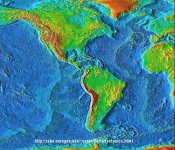 Atlantis 2 ©@.jpg34.4 KB · Views: 1,289
Atlantis 2 ©@.jpg34.4 KB · Views: 1,289 -
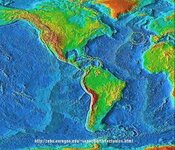 Cuban anol..JPG48.1 KB · Views: 1,302
Cuban anol..JPG48.1 KB · Views: 1,302 -
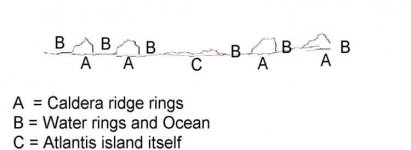 6_Side_view_of_Atlantis_Caldera_.jpg11 KB · Views: 1,277
6_Side_view_of_Atlantis_Caldera_.jpg11 KB · Views: 1,277 -
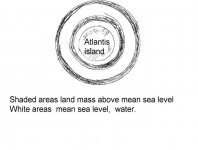 Vertical_view_of_the_Atlantis_caldera_.jpg20.2 KB · Views: 1,283
Vertical_view_of_the_Atlantis_caldera_.jpg20.2 KB · Views: 1,283 -
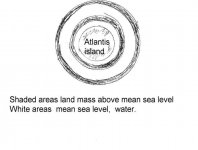 Vertical_view_of_the_Atlantis_caldera_.jpg20.2 KB · Views: 1,277
Vertical_view_of_the_Atlantis_caldera_.jpg20.2 KB · Views: 1,277 -
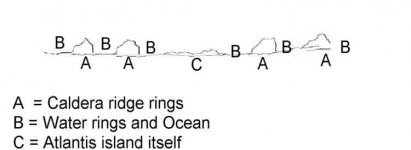 6_Side_view_of_Atlantis_Caldera_.jpg11 KB · Views: 1,273
6_Side_view_of_Atlantis_Caldera_.jpg11 KB · Views: 1,273 -
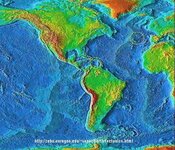 Cuban anol..JPG48.1 KB · Views: 1,278
Cuban anol..JPG48.1 KB · Views: 1,278 -
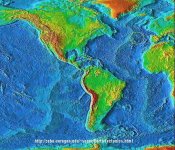 Atlantis 2 ©@.jpg34.4 KB · Views: 1,311
Atlantis 2 ©@.jpg34.4 KB · Views: 1,311
Zeitgeist_Xero
Jr. Member
- Jun 5, 2006
- 27
- 8
If Atlantis were so advanced; why would they have knowingly built the key city inside the heart of a Volcano...
I realy can't see how Atlantis, from Plato's works, can be proven as something of fact; based on previous posts (which I have put in this forum topic). Plus, I can't see how Tayopa's explanation of the city built on a volcano would make any sense; when you compare it to the other details written about how Atlantis was so technologically advanced.
I realy can't see how Atlantis, from Plato's works, can be proven as something of fact; based on previous posts (which I have put in this forum topic). Plus, I can't see how Tayopa's explanation of the city built on a volcano would make any sense; when you compare it to the other details written about how Atlantis was so technologically advanced.
Real de Tayopa Tropical Tramp
Gold Member
Allo Zeist: You -posted -->
why would they have knowingly built the key city inside the heart of a Volcano...
~~~~~~~~~~~~
Heck, they do this even today, when we know better. However, I sincerely doubt that this was an active one. spewing out fire and brimstone. This was most probably just a beautiful peaceful site well protected from storms and rough seas. See the picture of Santorini as an example.
\
Don Jose de La Mancha
why would they have knowingly built the key city inside the heart of a Volcano...
~~~~~~~~~~~~
Heck, they do this even today, when we know better. However, I sincerely doubt that this was an active one. spewing out fire and brimstone. This was most probably just a beautiful peaceful site well protected from storms and rough seas. See the picture of Santorini as an example.
\
Don Jose de La Mancha
Attachments
Oroblanco
Gold Member
- Jan 21, 2005
- 7,838
- 9,827
- Detector(s) used
- Tesoro Lobo Supertraq, (95%) Garrett Scorpion (5%)
Greetings,
WilliamTheFinder wrote:
I respectfully disagree, as our mutual amigo Real de Tayopa has pointed out, Atlantis was never a continent, it is not described as such by Plato and the "true continent" he refers to is the Americas, not Atlantis. It was a group of islands, and in other sources we learn that there were ten large islands altogether.
As you have good access to a decent library, I am a little surprised that you have failed to find any of the other ancient sources. I think they have been mentioned before, but Diodorus Siculus' work "Library of History" has a fair amount of information on Atlantis, (and the supposedly "mythical" Amazons as well) much of which cannot be traced to Plato; you seem not to have found out about Crantor's columns in Egypt (preserved in Proclus' work, "Commentary on Timaeus"), nor the other less-well-known sources such as Theopompous, Marcellinus, Arnobius, Philo Judaeus, Marcellus, Aelian, Manetho, Sanchuniathon, or the Indian epic Mahabharata. Even Homer and Hesiod have references that are directly applicable, when we realize that "myth" has been created by allegorizing historical fact into epic poetry. This is NOT an all-inclusive list of ancient sources on Atlantis either, we have not touched upon Aztec and Mayan myths, such as Aztlan, which has some striking parallels.
Just a side note here, but as you have so artfully denigrated Herodotus's mention of the Atlantis sea, did you also know that he included a tribe in Africa named "Atlantes"? I would also point out that Sanchuniathon, the Phoenician historian, writing in 1193 BC, told of the "Aleteans". This fairly predates Plato, Herodotus, and even Solon. Heck even the Egyptian Book of the Dead which is believed to be composed around 4000 BC, tells of king Thoth who ruled an Island in the West which was destroyed by water, and he brought the surviving rulers eastward to Egypt. With your access to a good library, you ought to be able to present the case FOR Atlantis, with a little effort. Of course it is always easier to take the skeptic's position, requiring far less research and legwork.
Zeitgeist_Xero wrote:
As you know, volcanoes are very 'tricky' critters, they may lie dormant for centuries, even for thousands of years, then suddenly "come to life" and erupt in a most violent manner. The Atlantians, assuming the description of building a city on a volcano is correct, might well have believed the volcano to be not dormant but extinct. If it had not erupted in centuries, why should they have believed otherwise? Besides, the volcano had nothing to do with the destruction of Atlantis, remember it was a day and night of "earthquakes and floods" - NOT a volcanic eruption of any kind. At least there is NO mention of any volcano erupting in Plato.
Zeitgeist_Xero also wrote:
I respectfully disagree about the idea of Atlantis being so technologically advanced. Plato makes no mention of anything remarkably advanced in technology for the Atlantians, other than having fairly modern plumbing. All the claims of highly advanced technologies for Atlantis can be traced to MODERN authors, as well as MODERN psychics. There is no ancient source that makes such claims about Atlantis, unless you count hot and cold running water as "advanced technology". Their descriptions will fit with about any Bronze-age civilization, with the exception of the plumbing and this was matched by the Minoans. Of course their use of horses and elephants, as well as seafaring, was not matched for some time by other ancient civilizations, but these are hardly "advanced technologies".
Good luck and good hunting, I hope you find the treasures that you seek.
your friend,
Oroblanco
WilliamTheFinder wrote:
And the dimensions plato lists for the concentric bands do not come anywhere close to describing an entire continent of the size he describes or the location you've identified on the seafloor
I respectfully disagree, as our mutual amigo Real de Tayopa has pointed out, Atlantis was never a continent, it is not described as such by Plato and the "true continent" he refers to is the Americas, not Atlantis. It was a group of islands, and in other sources we learn that there were ten large islands altogether.
Or another credible historical tradition that puts a decently sized land mass in the same location.
As you have good access to a decent library, I am a little surprised that you have failed to find any of the other ancient sources. I think they have been mentioned before, but Diodorus Siculus' work "Library of History" has a fair amount of information on Atlantis, (and the supposedly "mythical" Amazons as well) much of which cannot be traced to Plato; you seem not to have found out about Crantor's columns in Egypt (preserved in Proclus' work, "Commentary on Timaeus"), nor the other less-well-known sources such as Theopompous, Marcellinus, Arnobius, Philo Judaeus, Marcellus, Aelian, Manetho, Sanchuniathon, or the Indian epic Mahabharata. Even Homer and Hesiod have references that are directly applicable, when we realize that "myth" has been created by allegorizing historical fact into epic poetry. This is NOT an all-inclusive list of ancient sources on Atlantis either, we have not touched upon Aztec and Mayan myths, such as Aztlan, which has some striking parallels.
Just a side note here, but as you have so artfully denigrated Herodotus's mention of the Atlantis sea, did you also know that he included a tribe in Africa named "Atlantes"? I would also point out that Sanchuniathon, the Phoenician historian, writing in 1193 BC, told of the "Aleteans". This fairly predates Plato, Herodotus, and even Solon. Heck even the Egyptian Book of the Dead which is believed to be composed around 4000 BC, tells of king Thoth who ruled an Island in the West which was destroyed by water, and he brought the surviving rulers eastward to Egypt. With your access to a good library, you ought to be able to present the case FOR Atlantis, with a little effort. Of course it is always easier to take the skeptic's position, requiring far less research and legwork.
Zeitgeist_Xero wrote:
If Atlantis were so advanced; why would they have knowingly built the key city inside the heart of a Volcano...
As you know, volcanoes are very 'tricky' critters, they may lie dormant for centuries, even for thousands of years, then suddenly "come to life" and erupt in a most violent manner. The Atlantians, assuming the description of building a city on a volcano is correct, might well have believed the volcano to be not dormant but extinct. If it had not erupted in centuries, why should they have believed otherwise? Besides, the volcano had nothing to do with the destruction of Atlantis, remember it was a day and night of "earthquakes and floods" - NOT a volcanic eruption of any kind. At least there is NO mention of any volcano erupting in Plato.
Zeitgeist_Xero also wrote:
If Atlantis were so advanced...<snip> and...I realy can't see how Atlantis, from Plato's works, can be proven as something of fact; based on previous posts (which I have put in this forum topic). Plus, I can't see how Tayopa's explanation of the city built on a volcano would make any sense; when you compare it to the other details written about how Atlantis was so technologically advanced.
I respectfully disagree about the idea of Atlantis being so technologically advanced. Plato makes no mention of anything remarkably advanced in technology for the Atlantians, other than having fairly modern plumbing. All the claims of highly advanced technologies for Atlantis can be traced to MODERN authors, as well as MODERN psychics. There is no ancient source that makes such claims about Atlantis, unless you count hot and cold running water as "advanced technology". Their descriptions will fit with about any Bronze-age civilization, with the exception of the plumbing and this was matched by the Minoans. Of course their use of horses and elephants, as well as seafaring, was not matched for some time by other ancient civilizations, but these are hardly "advanced technologies".
Good luck and good hunting, I hope you find the treasures that you seek.
your friend,
Oroblanco
WilliamTheFinder
Jr. Member
- May 9, 2008
- 84
- 8
well, I like the enthusiasm, but here's my problem
Several of the locations you've mentioned, primarily in Herodotus* and Sanchuniathon, merely have similar sounding names..(The Aleteans and other Atlantians are both located in the middle of deserts)
So...the question I have to ask is "Is the name of this lost island actually 'atlantis' or some iteration thereof"?
see...while I am willing to accept the atlantis legend**, the problem I have is that when these other locations are invoked, certain problems begin to appear
yes, perhaps the Maya and Aztec people in some way kept the memory of Atlantis alive, just like the Phoenicians, Egyptians, Indians, et. al...but then why are we looking at Plato's location so closely? Why does the place even have to be called "atlantis" or match ANY of Plato's criterion? Given that in the broadest sense these legends only discuss a land mass sinking, and do not agree upon where it was, when it sank, or what kind of people lived there (even less, if you're going to bring Aztlan into the picture...Aztlan literally means "Reedy place" and seems more like a swamp or lake than a sunken island. No Aztec legend I've looked at actually points to a natural disaster per say.)
Why are we snooping around the atlantic when the Boturini Codex clearly puts Aztlan west of the Aztec's current location? or lost islands near India where the kingdoms of the Mahabharata are located (I'm going to assume that's the atlantis allusion in that epic)? Why are we looking for concentric rings and exotic metals, mentioned only in one source, while far more of the "other instances of atlantis" you've mentioned have similarities we haven't even considered...say an abundance of reeds or bright colored soil, found (suspiciously) in BOTH the book of the dead and the legends of Aztlan...both of which allude to a "Field of reeds" or a "Reedy place"? Why are certain very-similar-to-atlantis myths such as the Easter Islander migration or the Greek myth of the Hesperides and the British myths of Avalon*** ignored just because they don't match up with Plato's description?
Most importantly, since none of the dates agree and several only antedate Plato by a few hundred years, (and the myth of Aztlan actually takes place post-zero-AD) why do we need to assume Atlantis was so 'dern old?
What I'm saying is that simply invoking legends of a sinking island or ancestral oceanic birthplace isn't enough...these invocations rely on the (very true) notion that legends can change or become corrupted over time...but there's absolutely no reason to believe that Plato got his descriptions right and the Aztecs/Indians/Egyptians did not, especially with the sticky issue of the age of Atlantis. These descriptions clearly do not point to one coherent location and so, if they are to be used, we will need to come up with some system to determine which ones are usable and which ones are not. If Atlantis really does pop up in legends throughout the world, we should be scrutinizing "Popol Vuh" and "Mahabharata" as closely as the "Timeus", many Aztec codicies and oral histories give descriptions as detailed as Plato. In fact, given that only a smattering of sources actually name the sinking island "Atlantis" compared to the numerous sources that state that migrating Indian tribes took a pit stop at a place called "Aztlan", or speak of a northwestern island that is notable for it's apples we really ought to re-name the thread "Avalon" or "Aztlan" instead of "Atlantis"
* If you re-read our thread, you will notice I brought up his mention of the "other atlantis" earlier...I certainly didn't ignore it.
** Given that I'm starting with the assumption the place exists and trying to confirm it (as I stated earlier) I could probably be accused of being overly credulous, not overly skeptical
*** Both these places have a spooky connection with apples, the Hesperides tend a garden of them, and Avalon is usually interpreted to mean "Isle of Appels"
Several of the locations you've mentioned, primarily in Herodotus* and Sanchuniathon, merely have similar sounding names..(The Aleteans and other Atlantians are both located in the middle of deserts)
So...the question I have to ask is "Is the name of this lost island actually 'atlantis' or some iteration thereof"?
see...while I am willing to accept the atlantis legend**, the problem I have is that when these other locations are invoked, certain problems begin to appear
yes, perhaps the Maya and Aztec people in some way kept the memory of Atlantis alive, just like the Phoenicians, Egyptians, Indians, et. al...but then why are we looking at Plato's location so closely? Why does the place even have to be called "atlantis" or match ANY of Plato's criterion? Given that in the broadest sense these legends only discuss a land mass sinking, and do not agree upon where it was, when it sank, or what kind of people lived there (even less, if you're going to bring Aztlan into the picture...Aztlan literally means "Reedy place" and seems more like a swamp or lake than a sunken island. No Aztec legend I've looked at actually points to a natural disaster per say.)
Why are we snooping around the atlantic when the Boturini Codex clearly puts Aztlan west of the Aztec's current location? or lost islands near India where the kingdoms of the Mahabharata are located (I'm going to assume that's the atlantis allusion in that epic)? Why are we looking for concentric rings and exotic metals, mentioned only in one source, while far more of the "other instances of atlantis" you've mentioned have similarities we haven't even considered...say an abundance of reeds or bright colored soil, found (suspiciously) in BOTH the book of the dead and the legends of Aztlan...both of which allude to a "Field of reeds" or a "Reedy place"? Why are certain very-similar-to-atlantis myths such as the Easter Islander migration or the Greek myth of the Hesperides and the British myths of Avalon*** ignored just because they don't match up with Plato's description?
Most importantly, since none of the dates agree and several only antedate Plato by a few hundred years, (and the myth of Aztlan actually takes place post-zero-AD) why do we need to assume Atlantis was so 'dern old?
What I'm saying is that simply invoking legends of a sinking island or ancestral oceanic birthplace isn't enough...these invocations rely on the (very true) notion that legends can change or become corrupted over time...but there's absolutely no reason to believe that Plato got his descriptions right and the Aztecs/Indians/Egyptians did not, especially with the sticky issue of the age of Atlantis. These descriptions clearly do not point to one coherent location and so, if they are to be used, we will need to come up with some system to determine which ones are usable and which ones are not. If Atlantis really does pop up in legends throughout the world, we should be scrutinizing "Popol Vuh" and "Mahabharata" as closely as the "Timeus", many Aztec codicies and oral histories give descriptions as detailed as Plato. In fact, given that only a smattering of sources actually name the sinking island "Atlantis" compared to the numerous sources that state that migrating Indian tribes took a pit stop at a place called "Aztlan", or speak of a northwestern island that is notable for it's apples we really ought to re-name the thread "Avalon" or "Aztlan" instead of "Atlantis"
* If you re-read our thread, you will notice I brought up his mention of the "other atlantis" earlier...I certainly didn't ignore it.
** Given that I'm starting with the assumption the place exists and trying to confirm it (as I stated earlier) I could probably be accused of being overly credulous, not overly skeptical
*** Both these places have a spooky connection with apples, the Hesperides tend a garden of them, and Avalon is usually interpreted to mean "Isle of Appels"
Real de Tayopa Tropical Tramp
Gold Member
Good morning William: I must agree with many of the points that you have brought up, but in themselves they do "not" negate the possibility / probability of Atlantis having existed, and at that location.
I must caution you, or anyone researching ancient history, to remember to never take any translation or story precisely word for word, only to use it for generalities. Most languages were not refined enough to give precisely what the writer may, or may not, have intended, hence many were taken out of context, the same for directions or descriptions.. If they were precise and correct, the object would not be still lost.
The incorrect version, after a few times of retelling or rewriting soon becomes a Shibboleth of accuracy and is followed blindly in persuit of the original object. Any suggestion of a change is ridiculed.
Tayopa is an excellent example, many have followed the Map, popularized in Dobie's book, Apache Gold & Yaqui Solver, only to fail. This despite it's being quite accurate, simply because they attempted to place it at an incorrect starting location once stated by an unknown author in the past. there after all followed this data blindly.
**************************************************************************************You posted -->
Aztlan literally means "Reedy place" and seems more like a swamp or lake than a sunken island. No Aztec legend I've looked at actually points to a natural disaster per say - while far more of the "other instances of Atlantis" you've mentioned have similarities we haven't even considered...say an abundance of reeds or bright colored soil, found (suspiciously) in BOTH the book of the dead and the legends of Aztlan
~~~~~~~~~~~~~~
I am trying to find the reference to such a location on the West coast of Spain in which they recently found some ancient temples. It was speculated that from ancient documents referring to "muddy shoals", that this might be Atlantis.
The directions that they had in those days, and supposedly limited knowledge of the earth, could have led them to believe that this was indeed Atlantis, while in actuality it lay much further to the west.
I posted on a document that referred the Origion of the Aztecs as being the lost tribe. It showed their migration from Jerusalem to the straights, to the British isles and Atlantis, then to the Americas in accordance with the accepted translation of their history.
However, Atlantis no longer existed at this time, so they must have been referring to the false alternate Atlantis on the west cost of Spain, the muddy swamp area.. Curious coincidence no?
************************************************************************************** Also posted -->
what I'm saying is that simply invoking legends of a sinking island or ancestral oceanic birthplace isn't enough
~~~~~~~~~~~~~~~~
Agreed it is very flimsy, but they are all that we have to go on at this time, and interstingly, can / could fit the proposed location extremely well, almost beyond reasonable doubt.
Don Jose de La Mancha
I must caution you, or anyone researching ancient history, to remember to never take any translation or story precisely word for word, only to use it for generalities. Most languages were not refined enough to give precisely what the writer may, or may not, have intended, hence many were taken out of context, the same for directions or descriptions.. If they were precise and correct, the object would not be still lost.
The incorrect version, after a few times of retelling or rewriting soon becomes a Shibboleth of accuracy and is followed blindly in persuit of the original object. Any suggestion of a change is ridiculed.
Tayopa is an excellent example, many have followed the Map, popularized in Dobie's book, Apache Gold & Yaqui Solver, only to fail. This despite it's being quite accurate, simply because they attempted to place it at an incorrect starting location once stated by an unknown author in the past. there after all followed this data blindly.
**************************************************************************************You posted -->
Aztlan literally means "Reedy place" and seems more like a swamp or lake than a sunken island. No Aztec legend I've looked at actually points to a natural disaster per say - while far more of the "other instances of Atlantis" you've mentioned have similarities we haven't even considered...say an abundance of reeds or bright colored soil, found (suspiciously) in BOTH the book of the dead and the legends of Aztlan
~~~~~~~~~~~~~~
I am trying to find the reference to such a location on the West coast of Spain in which they recently found some ancient temples. It was speculated that from ancient documents referring to "muddy shoals", that this might be Atlantis.
The directions that they had in those days, and supposedly limited knowledge of the earth, could have led them to believe that this was indeed Atlantis, while in actuality it lay much further to the west.
I posted on a document that referred the Origion of the Aztecs as being the lost tribe. It showed their migration from Jerusalem to the straights, to the British isles and Atlantis, then to the Americas in accordance with the accepted translation of their history.
However, Atlantis no longer existed at this time, so they must have been referring to the false alternate Atlantis on the west cost of Spain, the muddy swamp area.. Curious coincidence no?
************************************************************************************** Also posted -->
what I'm saying is that simply invoking legends of a sinking island or ancestral oceanic birthplace isn't enough
~~~~~~~~~~~~~~~~
Agreed it is very flimsy, but they are all that we have to go on at this time, and interstingly, can / could fit the proposed location extremely well, almost beyond reasonable doubt.
Don Jose de La Mancha
WilliamTheFinder
Jr. Member
- May 9, 2008
- 84
- 8
you're right about one thing, it doesn't negate the possibility of Atlantis.
My hypothesis has always been the coast of Spain or the British isles themselves...though the latter breaks with plato substantially
My hypothesis has always been the coast of Spain or the British isles themselves...though the latter breaks with plato substantially
Real de Tayopa Tropical Tramp
Gold Member
william, "ONE THING"  sniff
sniff
Don Jose de La Mancha
 sniff
sniff Don Jose de La Mancha
WilliamTheFinder
Jr. Member
- May 9, 2008
- 84
- 8
didn't mean it like that, my southern-history-brother...
meant to emphasize it...like 'You got one thing right'
Obviously, you got more right than that...though I'm still convinced your work on Atlantis has been a clever dodge to stop us from asking about Tayopa
Thing I've always liked about my hypothesis (dispite the breaks from Plato and the fact that convenience should really factor in) is that I could go check up on it without the aid of a scuba suit, and maybe eat some apples on the way
meant to emphasize it...like 'You got one thing right'
Obviously, you got more right than that...though I'm still convinced your work on Atlantis has been a clever dodge to stop us from asking about Tayopa
Thing I've always liked about my hypothesis (dispite the breaks from Plato and the fact that convenience should really factor in) is that I could go check up on it without the aid of a scuba suit, and maybe eat some apples on the way
Real de Tayopa Tropical Tramp
Gold Member
William, may I ?---------\__QQQQQ___/ "
Don Jose de La mancha
"Tayopa? what Tayopa? Don need no stnkin Tayopa"!
Don Jose de La mancha
"Tayopa? what Tayopa? Don need no stnkin Tayopa"!
Oroblanco
Gold Member
- Jan 21, 2005
- 7,838
- 9,827
- Detector(s) used
- Tesoro Lobo Supertraq, (95%) Garrett Scorpion (5%)
HOLA amigos,
Interesting that you noticed the apples. It is perhaps a Greek play on words, for the Greek word for "apples" is the same for "sheep". Hence "golden apples" might be referring to golden-fleeced sheep. You are in error on a few points too, the Aleteans are not in the desert, the island "Atala" described in the Mahabharata can be located fairly well as being just west of the Canaries in the "Western Ocean" which is how the Atlantic is referred to in Indian epics (as well as Babylonian, Sumerian etc). The epic war of the Gods and Asuras in which the island of Atala and all its inhabitants sink into the "Western Ocean". Homer Refers to the imprisonment of the Titan Cronos at the "far end of the earth" beneath the "waters of the restless sea" in the Iliad; the Vishnu Purana locates Atala, the White Island, in the "Western Ocean" at same latitude as Canary Islands in the Atlantic. Hesiod tells us of the Titans who, after losing a ten-year war, were imprisoned beneath the waters of the Ocean in the far West. I do not have my copy of Cory's Ancient Fragments handy (packed in storage) but if you limit your research into Atlantis to Plato and Plato alone, you are hearing only one version of the events. It is logical that other witnesses of such a disaster and destruction, viewing it from various points separated by hundreds of miles or even across seas, would have slightly different versions.
You should take note that Plato said Solon changed the names he found in the original story to Greek-sounding names, after finding out the meanings of the names. Here is the relevant passage:
Yet, before proceeding further in the narrative, I ought to warn
you, that you must not be surprised if you should perhaps hear
Hellenic names given to foreigners. I will tell you the reason of
this: Solon, who was intending to use the tale for his poem,
enquired into the meaning of the names, and found that the early
Egyptians in writing them down had translated them into their own
language, and he recovered the meaning of the several names and when
copying them out again translated them into our language. My
great-grandfather, Dropides, had the original writing, which is
still in my possession, and was carefully studied by me when I was a
child. Therefore if you hear names such as are used in this country,
you must not be surprised, for I have told how they came to be
introduced.
So we can safely assume that "Atlantis" was likely NOT the name used by the people of the islands, nor the name used by other nations when referring to them - though it is probable that the names would be similar. Hence we have Aleteans, Atlantes, as well as geographic place names such as Atlan (Isthmus of Panama), Aztlan (Toltec mythology), Atitlan (Guatemala), and Aztalan (Wisconsin). As you know, geographic place names are among the most enduring things known to man, they remain in use long after the people who named them are gone.
Just as an aside here, but the Aztec tale of Aztlan is told in several codices, and it is in the depictions of the island of Aztlan (which by the way means either "place of whiteness" or "place of cranes" not "reedy place") we can clearly see a depiction of a VOLCANO that is spewing forth and erupting. (Example here from the Boturini Codex

There are different versions of the Aztec migration saga too, one places Aztlan off in the sea to the EAST, not north or west. This version is very unpopular among the folks trying to lay claim to the western USA as their "homeland" Aztlan, as might be expected. Of course for the Aztec tale of Aztlan to be relevant, their timeline must be very far off, which is entirely possible. Until other cultures recorded the arrival of Aztecs in their respective areas in central Mexico, we cannot confirm much of anything about their movements or timeline before that point.
I am aware of your revulsion of Ignatius Donnely, who is largely responsible for the continuing interest in Atlantis, and undeniably he got a great deal wrong. However perhaps he is more like Schliemann than we would admit, in that he was on the right track, just mis-interpreting many things. You know that he identified the great flood of Noah (or Deucalion, Gilgamesh etc) as being another report of the end of Atlantis, and perhaps this is what we are examining - several different reports of a great cataclysm that took place at the end of the last Ice Age, or the end of the Younger Dryas period, when the sea levels around the world suddenly and rapidly rose. If there was an "Ice Age Civilization" (call it Atlantis for lack of a true name) that was existing at the time, it is logical that they would be largely built close to the seas where their seagoing trade and expeditions could easily launch. Such a civilization would be totally sunk today by the rising seas.
<begin RANT> - I hate it when we see the professional skeptics (historians) dismiss the idea of such a great disaster destroying an Ice Age civilization, with the statement that "If anything so great happened and there were people to witness it, we would have some kind of record of it, even if only in folk tales" well isn't that exactly what we have? Sheesh. <end RANT>
Good luck and good hunting amigos, I hope you find the treasures that you seek.
your friend,
Oroblanco
Interesting that you noticed the apples. It is perhaps a Greek play on words, for the Greek word for "apples" is the same for "sheep". Hence "golden apples" might be referring to golden-fleeced sheep. You are in error on a few points too, the Aleteans are not in the desert, the island "Atala" described in the Mahabharata can be located fairly well as being just west of the Canaries in the "Western Ocean" which is how the Atlantic is referred to in Indian epics (as well as Babylonian, Sumerian etc). The epic war of the Gods and Asuras in which the island of Atala and all its inhabitants sink into the "Western Ocean". Homer Refers to the imprisonment of the Titan Cronos at the "far end of the earth" beneath the "waters of the restless sea" in the Iliad; the Vishnu Purana locates Atala, the White Island, in the "Western Ocean" at same latitude as Canary Islands in the Atlantic. Hesiod tells us of the Titans who, after losing a ten-year war, were imprisoned beneath the waters of the Ocean in the far West. I do not have my copy of Cory's Ancient Fragments handy (packed in storage) but if you limit your research into Atlantis to Plato and Plato alone, you are hearing only one version of the events. It is logical that other witnesses of such a disaster and destruction, viewing it from various points separated by hundreds of miles or even across seas, would have slightly different versions.
You should take note that Plato said Solon changed the names he found in the original story to Greek-sounding names, after finding out the meanings of the names. Here is the relevant passage:
Yet, before proceeding further in the narrative, I ought to warn
you, that you must not be surprised if you should perhaps hear
Hellenic names given to foreigners. I will tell you the reason of
this: Solon, who was intending to use the tale for his poem,
enquired into the meaning of the names, and found that the early
Egyptians in writing them down had translated them into their own
language, and he recovered the meaning of the several names and when
copying them out again translated them into our language. My
great-grandfather, Dropides, had the original writing, which is
still in my possession, and was carefully studied by me when I was a
child. Therefore if you hear names such as are used in this country,
you must not be surprised, for I have told how they came to be
introduced.
So we can safely assume that "Atlantis" was likely NOT the name used by the people of the islands, nor the name used by other nations when referring to them - though it is probable that the names would be similar. Hence we have Aleteans, Atlantes, as well as geographic place names such as Atlan (Isthmus of Panama), Aztlan (Toltec mythology), Atitlan (Guatemala), and Aztalan (Wisconsin). As you know, geographic place names are among the most enduring things known to man, they remain in use long after the people who named them are gone.
Just as an aside here, but the Aztec tale of Aztlan is told in several codices, and it is in the depictions of the island of Aztlan (which by the way means either "place of whiteness" or "place of cranes" not "reedy place") we can clearly see a depiction of a VOLCANO that is spewing forth and erupting. (Example here from the Boturini Codex


There are different versions of the Aztec migration saga too, one places Aztlan off in the sea to the EAST, not north or west. This version is very unpopular among the folks trying to lay claim to the western USA as their "homeland" Aztlan, as might be expected. Of course for the Aztec tale of Aztlan to be relevant, their timeline must be very far off, which is entirely possible. Until other cultures recorded the arrival of Aztecs in their respective areas in central Mexico, we cannot confirm much of anything about their movements or timeline before that point.
I am aware of your revulsion of Ignatius Donnely, who is largely responsible for the continuing interest in Atlantis, and undeniably he got a great deal wrong. However perhaps he is more like Schliemann than we would admit, in that he was on the right track, just mis-interpreting many things. You know that he identified the great flood of Noah (or Deucalion, Gilgamesh etc) as being another report of the end of Atlantis, and perhaps this is what we are examining - several different reports of a great cataclysm that took place at the end of the last Ice Age, or the end of the Younger Dryas period, when the sea levels around the world suddenly and rapidly rose. If there was an "Ice Age Civilization" (call it Atlantis for lack of a true name) that was existing at the time, it is logical that they would be largely built close to the seas where their seagoing trade and expeditions could easily launch. Such a civilization would be totally sunk today by the rising seas.
<begin RANT> - I hate it when we see the professional skeptics (historians) dismiss the idea of such a great disaster destroying an Ice Age civilization, with the statement that "If anything so great happened and there were people to witness it, we would have some kind of record of it, even if only in folk tales" well isn't that exactly what we have? Sheesh. <end RANT>
Good luck and good hunting amigos, I hope you find the treasures that you seek.
your friend,
Oroblanco
Old Dog
Gold Member
Oroblanco said:HOLA amigos,
<begin RANT> - I hate it when we see the professional skeptics (historians) dismiss the idea of such a great disaster destroying an Ice Age civilization, with the statement that "If anything so great happened and there were people to witness it, we would have some kind of record of it, even if only in folk tales" well isn't that exactly what we have? Sheesh. <end RANT>
Thanks Amigo,
I have wanted to say that exact thing for a long time.
We have many pictures of what can only be an outside influence,
along an Egyptian or Phoenician line of influence.
I totally agree that your 'Rant' is justified.
Thom
Oroblanco
Gold Member
- Jan 21, 2005
- 7,838
- 9,827
- Detector(s) used
- Tesoro Lobo Supertraq, (95%) Garrett Scorpion (5%)
GRACIAS mi amigo Thom! You and I seem to think along similar lines pretty often - proof of that old saying, "great minds think alike" - or is it "sick minds think alike"?!? 










WilliamTheFinder
Jr. Member
- May 9, 2008
- 84
- 8
Please understand that I'm not setting out to disprove Atlantis...there's definitely folktales in circulation that are suspicious, if you look at my post, you'll notice that what I'm asking for is another detailed description, like Plato's, that can tell me where to search and what to look for. I need something a little better than "Oh, it was an island to the west" or "It was an island that sank" because these are almost cultural universals...yes, this may point to a pangenic origin of all mankind in the ancient cities of the Atlantian empire, but it's not very useful for earmarking any given location as "Atlantis" because the name, location, date, and description varies substantially...the most common thread I can find is "Westish of Greece, eastish of america...and that's only by those who discount every Native Culture that points their origins to the north, south, or west of the Americas. The natives of easter island, for example, trace the ancestral origin of their race in a very atlantian manner, but almost universally point to the west for the source of their homeland.
Primary document analysis is very hard, especially in this case, since you basically have to concede that people got some details wrong to make the whole pattern line up. When we do that on real locations, we need a system to determine what's been corrupted and forgotten, what's likely to have been fabricated, and who would know more than whom. We would, for example, likely trust the exiled Atlantian historians themselves (if you believe the Aztlan/book of the dead hypothesis) than a non-atlantian philosopher who heard the story (at best) second or third hand. If we're convinced the other historians have mentioned actual atlantian colonies or exiled settlements, we'd certainly analyze THEIR data far more closely than that of a Philosopher, unless there's reason to believe that Plato is speaking more truthfully...perhaps because his information is more detailed? That presents problems of it's own, however, because the codex we've both been bringing up lists TO THE DAY, the date of the march from Aztlan, which is definitively post AD...now, sure, date inflation/deflation happens, but the entire POINT of the Atlantis myth is that Plato DIDN'T get his date wrong, otherwise, it's not terribly exceptional...we'd need to have some evidence to show that Plato didn't exaggerate the date, or the location...to do that, to do a lot of these things, we'd need another "Atlantis-like" description with enough details in tandem to compare the locations...something from the ballpark time period, preferably but not necessarily greek, with matching details...then, we use those details to build the system...
Now, you've brought up a lot of things that do share commonalities...the problem is that if we're accepting them all as evidence, we need to consider them all equally. the only meaningful information that can be extracted from the numerous sources you've mentioned is
1) There was an island or landmass, maybe but not necessarily west of greece
2) It sank or got lost
some don't even mention that, and just have a race of more advanced/heroic people coming from the west.
Now, lest you accuse me of being skeptical, or bring up the countless historical locations once deemed "legendary" that were proven true, such as troy and jerico, I'd like to point out that the above method is more or less how Schliemann's find was identified AS troy. I work primarily in the field of the history of the occult, and deal almost exclusively in legends and philosophical systems that cannot be understood without a grain of belief in them...I definitely have a mind open for Atlantis, but I don't think the proof of Atlantis can be found in Hindu epics or Native American Codex's* anymore than the proof of alchemy can be found in Chinese poetry or african tribal lore**
*err...codicies
**my Primary specialty...similar beliefs about the transcendent nature of gold, the transmutation of the elements, and the existence of an immortality medicine made from gold occur all over the world...this doesn't mean that they share one common "storyteller" and, most importantly THIS DOESN'T MAKE IT TRUE
Primary document analysis is very hard, especially in this case, since you basically have to concede that people got some details wrong to make the whole pattern line up. When we do that on real locations, we need a system to determine what's been corrupted and forgotten, what's likely to have been fabricated, and who would know more than whom. We would, for example, likely trust the exiled Atlantian historians themselves (if you believe the Aztlan/book of the dead hypothesis) than a non-atlantian philosopher who heard the story (at best) second or third hand. If we're convinced the other historians have mentioned actual atlantian colonies or exiled settlements, we'd certainly analyze THEIR data far more closely than that of a Philosopher, unless there's reason to believe that Plato is speaking more truthfully...perhaps because his information is more detailed? That presents problems of it's own, however, because the codex we've both been bringing up lists TO THE DAY, the date of the march from Aztlan, which is definitively post AD...now, sure, date inflation/deflation happens, but the entire POINT of the Atlantis myth is that Plato DIDN'T get his date wrong, otherwise, it's not terribly exceptional...we'd need to have some evidence to show that Plato didn't exaggerate the date, or the location...to do that, to do a lot of these things, we'd need another "Atlantis-like" description with enough details in tandem to compare the locations...something from the ballpark time period, preferably but not necessarily greek, with matching details...then, we use those details to build the system...
Now, you've brought up a lot of things that do share commonalities...the problem is that if we're accepting them all as evidence, we need to consider them all equally. the only meaningful information that can be extracted from the numerous sources you've mentioned is
1) There was an island or landmass, maybe but not necessarily west of greece
2) It sank or got lost
some don't even mention that, and just have a race of more advanced/heroic people coming from the west.
Now, lest you accuse me of being skeptical, or bring up the countless historical locations once deemed "legendary" that were proven true, such as troy and jerico, I'd like to point out that the above method is more or less how Schliemann's find was identified AS troy. I work primarily in the field of the history of the occult, and deal almost exclusively in legends and philosophical systems that cannot be understood without a grain of belief in them...I definitely have a mind open for Atlantis, but I don't think the proof of Atlantis can be found in Hindu epics or Native American Codex's* anymore than the proof of alchemy can be found in Chinese poetry or african tribal lore**
*err...codicies
**my Primary specialty...similar beliefs about the transcendent nature of gold, the transmutation of the elements, and the existence of an immortality medicine made from gold occur all over the world...this doesn't mean that they share one common "storyteller" and, most importantly THIS DOESN'T MAKE IT TRUE
Oroblanco
Gold Member
- Jan 21, 2005
- 7,838
- 9,827
- Detector(s) used
- Tesoro Lobo Supertraq, (95%) Garrett Scorpion (5%)
SALUDOS amigos,
WilliamTheFinder, you keep referring to that specific and detailed description of the capital city of the Atlantians, as found in Plato - well I (respectfully) have my doubts about this specific part of his tale. As we know, Plutarch accused Plato not of inventing the tale but of embellishing it, and he had at least two examples of lost/destroyed cities/civilizations he could draw upon for dazzling details to add to Solon's story - namely the sudden destruction of Helike and of the Minoan empire. The folks who point to Santorini (Thera) as the "real" Atlantis love to refer to the probable layout of the city that once stood where there is now a great hole in the island full of water, which is depicted in a wall fresco also found there - a city on an island, with rings of earth and sea and boats plying the waters. I am fairly convinced that these specific details, as well as the fairly modern plumbing found among Minoan sites (including flush toilets and showers, with hot and cold running water) are very likely details that Plato chose to add onto the original tale of Atlantis. When we turn to other ancient sources on Atlantis, (we can limit it to those which are quite close to Plato for this purpose, such as Diodorus, Proclus and Theopompous) we find no description of any such great city with rings of earth and sea, nor of modern plumbing. Only a description of an island civilization, which was warlike and powerful, and which was destroyed. In my opinion, this is a fair indication of what Plato added, that we do not find these specific details in those other sources.
(Map of Santorini, known as Thera in ancient times)

I must apologize to our mutual amigo Don Jose', Dueno de Real e Minas de Tayopa, and would add that the apparent circular features in his proposed location certainly do not prove it NOT to be Atlantis, I just don't think that these particular details are going to turn out to be in the original Atlantis.
Good luck and good hunting, I hope you find the treasures that you seek.
your friend,
Oroblanco

WilliamTheFinder, you keep referring to that specific and detailed description of the capital city of the Atlantians, as found in Plato - well I (respectfully) have my doubts about this specific part of his tale. As we know, Plutarch accused Plato not of inventing the tale but of embellishing it, and he had at least two examples of lost/destroyed cities/civilizations he could draw upon for dazzling details to add to Solon's story - namely the sudden destruction of Helike and of the Minoan empire. The folks who point to Santorini (Thera) as the "real" Atlantis love to refer to the probable layout of the city that once stood where there is now a great hole in the island full of water, which is depicted in a wall fresco also found there - a city on an island, with rings of earth and sea and boats plying the waters. I am fairly convinced that these specific details, as well as the fairly modern plumbing found among Minoan sites (including flush toilets and showers, with hot and cold running water) are very likely details that Plato chose to add onto the original tale of Atlantis. When we turn to other ancient sources on Atlantis, (we can limit it to those which are quite close to Plato for this purpose, such as Diodorus, Proclus and Theopompous) we find no description of any such great city with rings of earth and sea, nor of modern plumbing. Only a description of an island civilization, which was warlike and powerful, and which was destroyed. In my opinion, this is a fair indication of what Plato added, that we do not find these specific details in those other sources.
(Map of Santorini, known as Thera in ancient times)

I must apologize to our mutual amigo Don Jose', Dueno de Real e Minas de Tayopa, and would add that the apparent circular features in his proposed location certainly do not prove it NOT to be Atlantis, I just don't think that these particular details are going to turn out to be in the original Atlantis.
Good luck and good hunting, I hope you find the treasures that you seek.
your friend,
Oroblanco

Top Member Reactions
-
 2410
2410 -
 1121
1121 -
 1119
1119 -
 908
908 -
 823
823 -
 807
807 -
 763
763 -
 725
725 -
 644
644 -
 522
522 -
 478
478 -
 466
466 -
 457
457 -
 429
429 -
 410
410 -
 406
406 -
O
369
-
 362
362 -
 358
358 -
 352
352
Users who are viewing this thread
Total: 3 (members: 0, guests: 3)
Latest Discussions
-
-
-
Recent finds - Large Cents, Jaw Harp, Cufflink, Buckle and Buttons
- Latest: Steve in PA
-
-


